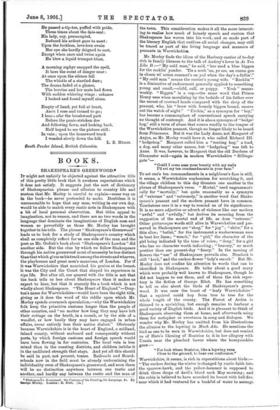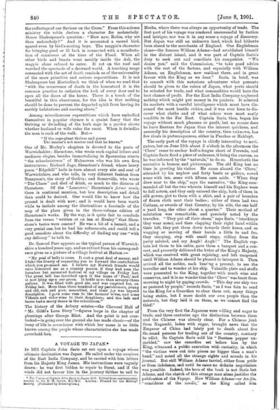BOOKS.
SHAKESPEARE'S GREENWOOD.*
IT might not unfairly be objected against the attractive title of this pretty little book that it awakens expectations which it does not satisfy. It suggests just the sort of dictionary of Shakespearian phrase and allusion to country life and custom that Mr. Morley is careful to explain—some way on in the book—he never pretended to make. Doubtless it is unreasonable to hope that any man, writing in our own day, would be able to match every rustic note in Shakespeare with a bit of local personal observation. But titles appeal to imagination, not to reason, and there are no two words in the language that dominate the imaginations of English men and women so powerfully as those Mr. Morley has brought together in his title. The phrase "Shakespeare's Greenwood" leads us to look for a study of Shakespeare's country which shall as completely reflect for us one side of the man and the poet as Mr. Ordish's book about "Shakespeare's London" did another side. But the clue by which we follow Shakespeare through his native greenwood must of necessity be less distinct than that which gives us his track among the streets and wharves, the playhouses and great men's mansions, of London. For if it was Warwickshire that nourished his genius at the breasts it was the City and the Court that shaped its experience in ripe life. But after all, our quarrel with the title is not that the book tells us less about Shakespeare than it makes US expect to hear, but that it scarcely fits a book which is not wholly about Shakespeare. "The Heart of England "—Dray- ton's name for Warwickshire—would have been the right title, giving as it does the word of the riddle upon which Mr. Morley spends overmuch speculation,—why the Warwickshire folk keep the primitive customs longer than the people of other counties, and "no matter how long they may have left their cottage on the heath, in a coomb, or by the side of a woodlet, or how busily they may have engaged in urban affairs, never entirely lose their native dialect." Obviously because Warwickshire is in the heart of England, a midland, inland county, without seaboard and consequently without ports, by which foreign customs and foreign speech would have been flowing in for centuries. The local vein is less mixed than in the coasting districts, and children imbibe it in the undiluted strength that stays. And yet all this should be said in past, not present, tenses. Railroads and Board- schools now in the field must be already undermining the individuality even of Shakespeare's greenwood, and soon there will be no distinction anywhere between one rustic and another, and hardly any between the rustic and the man of • S7sakespealies Greenwood the Customs of the Country, the Language, Sc. By George Morley. London : D. Nutt. 158.1 the town. This consideration makes it all the more interest- ing to realise how much of homely speech and custom that Shakespeare has woven into his work, and so made part of the literary English that outlives all social changes, may still be traced as part of the living language and manners of peasants in Warwickshire.
Mr. Morley finds the idiom of the Harbury carrier of to-day rich in family likeness to the talk of Audrey's lover in As You Like It :—" My ould man," he said, "hey- med a blue biggen for the recklin' yonder. 'Tis a nesh 'un, ye see, an canna goo in closen wi' outen summat's on yed when the day's a-fallin'." " My ould man" means the carrier's young wife. " Recklin' " is a diminutive of endearment generally applied to something young and small,—child, calf, or puppy. " Nesh " means weakly. " Biggen" is a cap,—the same word that Prince Henry uses when moralising by the bedside of his father over the unrest of crowned heads compared with the sleep of the peasant, who, his "brow with homely biggen bound, snores out the watch of night." "Urchin," as a synonym for "boy," has become a commonplace of conventional speech carrying no thought of contempt. And it is also a synonym of "hedge- hog," still a term of abuse that comes readily to the tongue of the Warwickshire peasant, though no longer likely to be heard from Princesses. But it was the Lady Anne, not Margaret of Anjou, as Mr. Morley would have it, who called Richard III. "hedgehog." Margaret called him a "rooting hog," a toad, a dog, and many other names, but " hedgehog " was left to Anne. It was, however, to Margaret that the old Duchess of Gloucester said—again in modern Warwickshire " Billings- gate "— " Could I come near your beauty with my nails
I'd set my ten commandments in your face."
To set one's ten commandments in a neighbour's face is still, it seems, a Warwickshire euphemism for scratching it, and the village children to this day threaten one another in the phrase of Shakespeare's verse. "Mortal," used ungrammati- cally for "mortally," but quite reasonably as a synonym of " extreme " and "extremely," is another word that Shake- speare's peasant and the modern peasant have in common. Touchstone uses it in a way to remind us of its significance. It is no mere adjective or adverb of violence like our modern " awful " and "awfully," but derives its meaning from the suggestion of the mortal end of life, as does "extreme." Other picturesque words still alive in Warwickshire and pre- served in Shakespeare are " shog," for " jog " ; " shive," for a thin slice; " batlet," for the instrument a washerwoman uses to beat her linen; "wench," for "girl," the character of the girl being indicated by the tone of voice; " doxy," for a girl who has no character worth indicating ; "bravery," so much prettier than our present-day "finery." In the naming of flowers the " use " of Shakespeare prevails also. Hemlock is still " keck," and the cuckoo-flower "lady's smock." But Mr. Morley does not confme his attention to words that can be identified in Shakespeare. He talks about a good many which were probably well known to Shakespeare, though he did not happen to use them, and of these the rich reper- tory is the fiction of George Eliot. He has something to tell us also about the birds of Shakespeare's green- wood. It was once the boast of "leafy Warwickshire" that a squirrel could hop from tree to tree for the whole length of the county. The Forest of Arden is thinned to a sprinkling, but enough remains to harbour a good variety of English birds. And it is pleasant to think of Shakespeare observing them at home, and afterwards using them for metaphor or sweetness in song and dialogue. We wonder why Mr. Morley has omitted from his illustrations the allusion to the lapwing in Much Ado. He mentions the bird as one to be seen in Warwickshire, but does not remind us of Hero's likening of Beatrice to it in her allegory with Ursula near the pleached bower where the honeysuckles grew:— "For look where Beatrice, like a lapwing runs Close to the ground, to hear our conference."
Warwickshire, it seems, is rich in superstitions about birds :— " The cuckoo during the winter is changed by rustic faith into the sparrow-hawk, and the yellow-hammer is supposed to drink three drops of devil's blood each May morning ; and the robin is believed to have scorched its breast with bell-fire, near which it had ventured for a beakful of water to assuage the sufferings of our Saviour on the Cross." From this solemn ministry the robin derives a character for melancholy.
Hence Shakespeare's question : "How now, Robin, why art thou melancholy ?" And it is accounted a sacred bird, spared even by bird's-nesting boys. The magpie's character for bringing good or ill luck is connected with a manifesta- tion of canniness at the time of the Flood. When all other birds and beasts went meekly inside the Ark, the magpie alone refused to enter. It sat on the roof and watched the spectacle of a drowned world. A touching usage connected with the act of death reminds us of the universality of the more primitive and serious superstitions. It is not Shakespeare but Maeterlinck we think of when we read that "with the occurrence of death in the homestead it is the common practice to unfasten the lock of every door and to open all the doors of the house. There is a touch of the beautiful in this observance, for the idea is that nothing should be done to prevent the departed spirit from leaving its earthly habitations and soaring above."
Among miscellaneous superstitions which have embodied themselves in popular rhymes is a quaint fancy that the thriving or dwindling of the herb sage in a garden shows whether husband or wife rules the roost. When it dwindles the man is cock of the walk. But— "If the sage-plant thrives and grows
The master's not master and that he knows."
One of Mr. Morley's chapters is devoted to the poets of Warwickshire; Shenstone, who wrote such capital letters and mediocre elegies, besides immortalising in Spenserian stanza "the schoolmistress" of Halesowen who was his own first instructress ; Richard Jago, Shenstone's friend, whose heavy poem " Edgehill " hails in turn almost every site and seat of Warwickshire, and who tells, in very different fashion from Tennyson's, the story of Grodiva ; and Somerville, who wrote "The Chase" and died of drink, so much to the distress of Shenstone. Of the " Leasowes," Shenstone's ferme °rage, there is continual mention, but less description and detail than could be desired. One would like to know how the
ground is dealt with now; and it would have been worth while to include among the illustrations a facsimile of the map of the place given in the three-volume edition of Shenstone's works. By the way, is it quite fair to conclude from the verses "written at an inn at Henley" that Shen- stone's tastes were coarse ? He was a bit of a hermit, and a very genial one, but he had his refinements, and could tell a good anecdote about the difficulty of finding any one "with any delicacy" to talk to.
Dr. Samuel Parr appears as the typical parson of Warwick- shire a hundred years ago, and an extract from his correspond- ence gives us a picture of a village festival at Hatton :—
"My peal of bells is come. It cost a great deal of money, and I take the liberty of requesting you to forward the contribution which you promised me. I believe my Norwich friends would nave honoured me as a country parson if they had seen the harmless but animated festival of my village on Friday last. The great bell has inscribed upon it the name of • Paul,' and is now lying upon our green. It holds more than seventy-three gallons. It was filled with good ale, and was emptied too, on Friday last. More than three hundred of my parishioners, young and old, rich and poor, assembled, and tbeir joy was beyond description. I gave some ruin to the farmers' wives, and some Vidoma and elder-wine to their daughters; and the lads and Lasses had a merry dance in the schoolroom."
The history of the Arbuzy estates—the Cheverel Hall of "Mr. Gilfes Love Story "—figures large in the chapter of gleanings after George Eliot. And the point is not over- looked—in going over the ground she has made classic—of the irony of life in accordance with which her name is so little known among the people whose characteristics she has made eousehold lore.







































 Previous page
Previous page